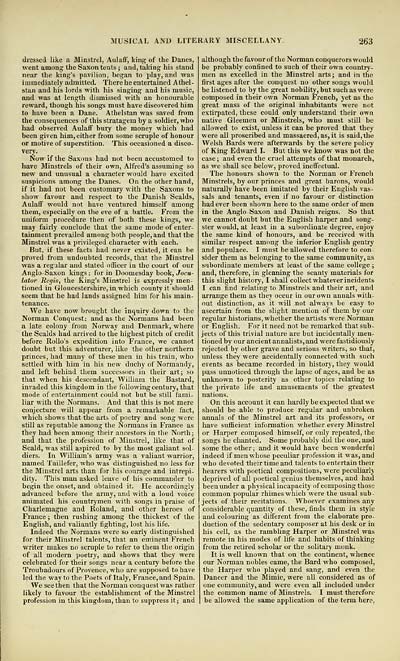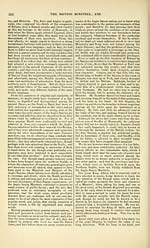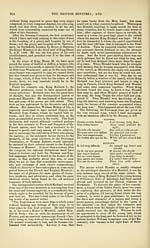Glen Collection of printed music > Printed music > British minstrel, and musical and literary miscellany
(271) Page 263
Download files
Complete book:
Individual page:
Thumbnail gallery: Grid view | List view

MUSICAL AND LITERARY MISCELLANY.
263
dressed like a Minstrel, Aulaff, king of the Danes,
went among the Saxon tents ; and, taking his stand
near the king's pavilion, began to play, and was
immediately admitted. There he entertained Athel-
stan and his lords with his singing and his music,
and was at length dismissed with an honourable
reward, though his songs must have discovered him
to have been a Dane. Athelstan was saved from
the consequences of this stratagem by a soldier, who
had observed Aulaff bury the money which had
been given him, either from some scruple of honour
or motive of superstition. This occasioned a disco-
very.
Now if the Saxons had not been accustomed to
have Minstrels of their own, Alfred's assuming so
new and unusual a character would have excited
suspicions among the Danes. On the other hand,
if it had not been customary with the Saxons to
show favour and respect to the Danish Scalds,
Aulaff would not have ventured himself among
them, especially on the eve of a battle. From the
uniform procedure then of both these kings, we
may fairly conclude that the same mode of enter-
tainment prevailed among both people, and that the
Minstrel was a privileged character with each.
But, if these facts had never existed, it can be
proved from undoubted records, that the Minstrel
was a regular and stated olKcer in the court of our
Anglo-Saxon kings: for in Doomesday book, Joca-
lator Regis, the King's Minstrel is expressly men-
tioned in Gloucestershire, in. which county it should
seem that he had lands assigned him for his main-
tenance.
We have now brought the inquiry down to the
Norman Conquest; and as the Normans had been
a late colony from Norway and Denmark, where
the Scalds had arrived to the highest pitch of credit
before RoUo's expedition into France, we cannot
doubt but this adventurer, like the other northern
princes, had many of these men in his train, who
settled with him in his new duchy of Normandy,
and left behind them successors in their art; so
that when his descendant, William the Bastard,
invaded this kingdom in the following century, that
mode of entertainment could not but be still fami-
liar with the Normans. And that this is not mere
conjecture will appear from a remarkable fact,
which shows that the arts of poetry and song were
still as reputable among the Normans in France as
they had been among their ancestors in tlie North;
and that the profession of Minstrel, like that of
Scald, was still aspired to by the most gallant sol.
diers. In William's army was a valiant warrior,
named Taillefer, who was distinguished no less for
the Minstrel arts than for his courage and intrepi-
dity. This man asked leave of his commander to
begin the onset, and obtained it. He accordingly
advanced before the army, and with a loud voice
animated his countrymen with songs in praise of
Charlemagne and Roland, and other heroes of
France ; then rushing among the thickest of the
English, and valiantly fighting, lost his life.
Indeed the Normans were so early distinguished
for their Minstrel talents, that an eminent French
writer makes no scruple to refer to them the origin
of all modern poetry, and shows that they were
celebrated for their songs near a century before the
Troubadours of Provence, who are supposed to have
led the way to the Poets of Italy, France, and Spain.
We see then that the Norman conquest was rather
likely to favour the establishment of the Minstrel
profession in this kingdom, than to suppress it ; and
although the favour of the Norman conquerors would
be probably confined to such of their own country-
men as excelled in the Minstrel arts ; and in the
first ages after the conquest no other songs would
be listened to by the great nobility, but such as were
composed in their own Norman French, yet as the
great mass of the original inhabitants were not
extirpated, these could only understand their own
native Gleemen or Minstrels, who must still be
allowed to exist, unless it can be proved that they
were all proscribed and massacred, as, it is said, ihe
Welsh Bards were afterwards by the severe policy
of King Edward I. But this we know was not tlie
case; and even the cruel attempts of that monarch,
as we shall see below, proved ineffectual.
The honours shown to the Norman or French
Minstrels, by our princes and great barons, would
naturally have been imitated by their English vas-
sals and tenants, even if no favour or distinction
had ever been shown here to the same order of men
in the Anglo-Saxon and Danish reigns. So that
we cannot doubt but the English harper and song-
ster would, at least in a subordinate degree, enjoy
the same kind of honours, and be received with
similar respect among the inferior English gentry
and popuJace. I must be allowed therefore to con
sider them as belonging to the same community, as
subordinate members at least of the same college ;
and, therefore, in gleaning the scanty materials for
this slight history, I shall collect whatever incidents
I can find relating to Minstrels and their art, and
arrange them as they occur in our own annals with-
out distinction, as it will not always be easy to
ascertain from the slight mention of them by our
regular historians, whether the artists were Norman
or English. For it need not be remarked that sub-
jects of this trivial nature are but incidentally men-
tioned by our ancient annalists, and were fastidiously
rejected by other grave and serious writers, so that,
unless they were accidentally connected with such
events as became recorded in history, they would
pass unnoticed through the lapse of ages, and be as
unknown to posterity as other topics relating to
the private life and amusements of the greatest
nations.
On this account it can haidly be expected that we
should be able to produce regular and unbroken
annals of the Minstrel art and its professors, or
have suflicient information whether every Minstrel
or Harper composed himself, or only repeated, the
songs he chanted. Some probably did the one, and
some the other; and it would have been wonderful
indeed if men whose peculiar profession it was, and
who devoted their time and talents to entertain their
hearers with poetical compositions, were peculiarly
deprived of all poetical genius themselves, and had
been under a physical incapacity of composing those
common popular rhimes which were the usual sub-
jects of their recitations. Whoever examines any
considerable quantity of these, finds them in style
and colouring as different from the elaborate pro-
duction of the sedentary composer at his desk or in
his cell, as the rambling Harper or Minstrel was
remote in his modes of life and habits of thinking
from the retired scholar or the solitary monk.
It is well known that on the continent, whence
our Norman nobles came, the Bard who composed,
the Harper who played and sang, and even the
Dancer and the Mimic, were all considered as of
one community, and were even all included under
the common name of Minstrels. I must therefore
be allowed the same application of the term here,
263
dressed like a Minstrel, Aulaff, king of the Danes,
went among the Saxon tents ; and, taking his stand
near the king's pavilion, began to play, and was
immediately admitted. There he entertained Athel-
stan and his lords with his singing and his music,
and was at length dismissed with an honourable
reward, though his songs must have discovered him
to have been a Dane. Athelstan was saved from
the consequences of this stratagem by a soldier, who
had observed Aulaff bury the money which had
been given him, either from some scruple of honour
or motive of superstition. This occasioned a disco-
very.
Now if the Saxons had not been accustomed to
have Minstrels of their own, Alfred's assuming so
new and unusual a character would have excited
suspicions among the Danes. On the other hand,
if it had not been customary with the Saxons to
show favour and respect to the Danish Scalds,
Aulaff would not have ventured himself among
them, especially on the eve of a battle. From the
uniform procedure then of both these kings, we
may fairly conclude that the same mode of enter-
tainment prevailed among both people, and that the
Minstrel was a privileged character with each.
But, if these facts had never existed, it can be
proved from undoubted records, that the Minstrel
was a regular and stated olKcer in the court of our
Anglo-Saxon kings: for in Doomesday book, Joca-
lator Regis, the King's Minstrel is expressly men-
tioned in Gloucestershire, in. which county it should
seem that he had lands assigned him for his main-
tenance.
We have now brought the inquiry down to the
Norman Conquest; and as the Normans had been
a late colony from Norway and Denmark, where
the Scalds had arrived to the highest pitch of credit
before RoUo's expedition into France, we cannot
doubt but this adventurer, like the other northern
princes, had many of these men in his train, who
settled with him in his new duchy of Normandy,
and left behind them successors in their art; so
that when his descendant, William the Bastard,
invaded this kingdom in the following century, that
mode of entertainment could not but be still fami-
liar with the Normans. And that this is not mere
conjecture will appear from a remarkable fact,
which shows that the arts of poetry and song were
still as reputable among the Normans in France as
they had been among their ancestors in tlie North;
and that the profession of Minstrel, like that of
Scald, was still aspired to by the most gallant sol.
diers. In William's army was a valiant warrior,
named Taillefer, who was distinguished no less for
the Minstrel arts than for his courage and intrepi-
dity. This man asked leave of his commander to
begin the onset, and obtained it. He accordingly
advanced before the army, and with a loud voice
animated his countrymen with songs in praise of
Charlemagne and Roland, and other heroes of
France ; then rushing among the thickest of the
English, and valiantly fighting, lost his life.
Indeed the Normans were so early distinguished
for their Minstrel talents, that an eminent French
writer makes no scruple to refer to them the origin
of all modern poetry, and shows that they were
celebrated for their songs near a century before the
Troubadours of Provence, who are supposed to have
led the way to the Poets of Italy, France, and Spain.
We see then that the Norman conquest was rather
likely to favour the establishment of the Minstrel
profession in this kingdom, than to suppress it ; and
although the favour of the Norman conquerors would
be probably confined to such of their own country-
men as excelled in the Minstrel arts ; and in the
first ages after the conquest no other songs would
be listened to by the great nobility, but such as were
composed in their own Norman French, yet as the
great mass of the original inhabitants were not
extirpated, these could only understand their own
native Gleemen or Minstrels, who must still be
allowed to exist, unless it can be proved that they
were all proscribed and massacred, as, it is said, ihe
Welsh Bards were afterwards by the severe policy
of King Edward I. But this we know was not tlie
case; and even the cruel attempts of that monarch,
as we shall see below, proved ineffectual.
The honours shown to the Norman or French
Minstrels, by our princes and great barons, would
naturally have been imitated by their English vas-
sals and tenants, even if no favour or distinction
had ever been shown here to the same order of men
in the Anglo-Saxon and Danish reigns. So that
we cannot doubt but the English harper and song-
ster would, at least in a subordinate degree, enjoy
the same kind of honours, and be received with
similar respect among the inferior English gentry
and popuJace. I must be allowed therefore to con
sider them as belonging to the same community, as
subordinate members at least of the same college ;
and, therefore, in gleaning the scanty materials for
this slight history, I shall collect whatever incidents
I can find relating to Minstrels and their art, and
arrange them as they occur in our own annals with-
out distinction, as it will not always be easy to
ascertain from the slight mention of them by our
regular historians, whether the artists were Norman
or English. For it need not be remarked that sub-
jects of this trivial nature are but incidentally men-
tioned by our ancient annalists, and were fastidiously
rejected by other grave and serious writers, so that,
unless they were accidentally connected with such
events as became recorded in history, they would
pass unnoticed through the lapse of ages, and be as
unknown to posterity as other topics relating to
the private life and amusements of the greatest
nations.
On this account it can haidly be expected that we
should be able to produce regular and unbroken
annals of the Minstrel art and its professors, or
have suflicient information whether every Minstrel
or Harper composed himself, or only repeated, the
songs he chanted. Some probably did the one, and
some the other; and it would have been wonderful
indeed if men whose peculiar profession it was, and
who devoted their time and talents to entertain their
hearers with poetical compositions, were peculiarly
deprived of all poetical genius themselves, and had
been under a physical incapacity of composing those
common popular rhimes which were the usual sub-
jects of their recitations. Whoever examines any
considerable quantity of these, finds them in style
and colouring as different from the elaborate pro-
duction of the sedentary composer at his desk or in
his cell, as the rambling Harper or Minstrel was
remote in his modes of life and habits of thinking
from the retired scholar or the solitary monk.
It is well known that on the continent, whence
our Norman nobles came, the Bard who composed,
the Harper who played and sang, and even the
Dancer and the Mimic, were all considered as of
one community, and were even all included under
the common name of Minstrels. I must therefore
be allowed the same application of the term here,
Set display mode to: Large image | Transcription
Images and transcriptions on this page, including medium image downloads, may be used under the Creative Commons Attribution 4.0 International Licence unless otherwise stated. ![]()
| Special collections of printed music > Glen Collection of printed music > Printed music > British minstrel, and musical and literary miscellany > (271) Page 263 |
|---|
| Permanent URL | https://digital.nls.uk/91438197 |
|---|
| Description | Scottish songs and music of the 18th and early 19th centuries, including music for the Highland bagpipe. These are selected items from the collection of John Glen (1833 to 1904). Also includes a few manuscripts, some treatises, and other books on the subject. |
|---|
| Description | The Glen Collection and the Inglis Collection represent mainly 18th and 19th century Scottish music, including Scottish songs. The collections of Berlioz and Verdi collected by bibliographer Cecil Hopkinson contain contemporary and later editions of the works of the two composers Berlioz and Verdi. |
|---|

